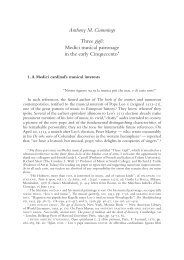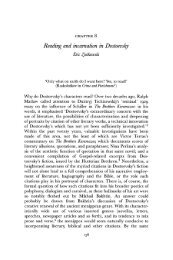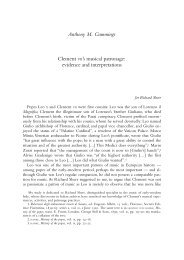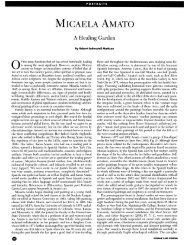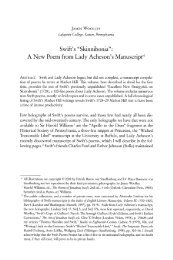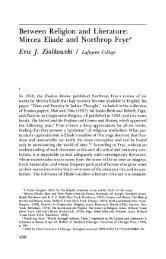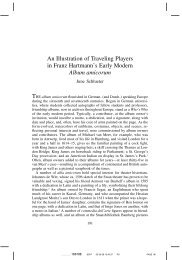courses of instruction - Lafayette College
courses of instruction - Lafayette College
courses of instruction - Lafayette College
Create successful ePaper yourself
Turn your PDF publications into a flip-book with our unique Google optimized e-Paper software.
the identification <strong>of</strong> selected vertebrates<br />
found in Pennsylvania. Prerequisite: Biol<br />
ogy 101-102, or permission <strong>of</strong> instructor.<br />
Lecture/laboratory/field trips. Offered in<br />
fall or spring semester. Mr. Young<br />
221. Biology <strong>of</strong> Vascular Plants. A survey<br />
<strong>of</strong> the major groups <strong>of</strong> vascular plants em<br />
phasizing the angiosperms and relating<br />
form to function at the cell, tissue, organ,<br />
and organismal levels. The overall impor<br />
tance <strong>of</strong> plants in ecosystem structure and<br />
environmental interactions are addressed.<br />
Laboratory includes plant tissue culture<br />
and some field work. Prerequisites: Biolo<br />
gy 101-102 or 104, or permission <strong>of</strong> in<br />
structor. Lecture/discussion/laboratory.<br />
Offered in spring semester. [W] Ms. Mineo<br />
225. Bacteriology and Mycology. Mor<br />
phology, ultrastructure, genetics, and<br />
physiology <strong>of</strong> bacteria and fungi are stud<br />
ied. Microbiological techniques, aseptic<br />
procedures, identification <strong>of</strong> bacteria,<br />
medical microbiology, computer simula<br />
tion, and microbiology <strong>of</strong> soil and water,<br />
food and dairy products are studied in the<br />
laboratory. Assigned readings <strong>of</strong> selected<br />
topics in medical and applied microbiolo<br />
gy and out-<strong>of</strong>-class required meetings are<br />
the basis for class writing projects. Prereq<br />
uisite: Biology 101-102, or permission <strong>of</strong><br />
instructor. Lecture/laboratory/discus<br />
sion/independent laboratory. Offered in<br />
fall or spring semester. [W] Mr. Majumdar<br />
231. Ecology. A study <strong>of</strong> the relationships<br />
between organisms and their environment<br />
emphasizing basic ecological principles<br />
and methods. Laboratory and field exer<br />
cises illustrate the theoretical concepts dis<br />
cussed in lecture and are writing-inten<br />
sive. Prerequisite: Biology 101-102, or per<br />
mission <strong>of</strong> instructor. Lecture/discus<br />
sion/laboratory. Offered in fall semester.<br />
[W] Ms. Waters<br />
235. Evolutionary Biology. An introduc<br />
tion to the principles <strong>of</strong> organic and mo<br />
lecular evolution. Topics include: genetic<br />
variation, natural selection, speciation, ad<br />
aptation, diversification, biogeography,<br />
BIOLOGY<br />
molecular evolution, and the mechanisms<br />
underlying each. Laboratory includes ex<br />
perimentation, computer simulation, and<br />
relevant reading/presentation <strong>of</strong> current<br />
primary literature in the field. Prerequi<br />
site: Biology 101-102. Lecture/discussion/<br />
laboratory. Offered in fall or spring semes<br />
ter. Mr. Leibel<br />
241. Genetics and Human Heredity. This<br />
course examines genetic principles and<br />
concepts in humans, other animals, plants,<br />
bacteria, and viruses with special empha<br />
sis on human genetic diseases, birth de<br />
fects, genetic engineering, and molecular<br />
genetics. The medical, social, and ethical<br />
implications <strong>of</strong> genetic research are dis<br />
cussed. Prerequisite: Biology 101-102, or<br />
permission <strong>of</strong> instructor. Lecture/discus<br />
sion. Offered in fall semester. Mr. Majumdar<br />
251. Human Physiology. This course uses<br />
a systems approach to human physiology.<br />
The functions <strong>of</strong> the major human organ<br />
systems and the physiological mecha<br />
nisms by which these functions are con<br />
trolled are considered. Prerequisite: Biolo<br />
gy 101-102, or permission <strong>of</strong> instructor.<br />
Lecture/laboratory. Offered in fall semes<br />
ter. Mr. Holliday, Ms. Schoeneck<br />
256. Neurobiology. This course examines<br />
the field <strong>of</strong> neuroscience from a cellular<br />
and molecular perspective, with the neu<br />
ron and neural networks as the focus <strong>of</strong><br />
discussion and experimentation. After an<br />
intensive look at neuronal cell biology and<br />
signaling, the course examines the cellular<br />
basis <strong>of</strong> higher-order functions, such as<br />
sensation, behavior, and memory. Prereq<br />
uisite: Biology 101-102, or permission <strong>of</strong><br />
instructor. Lecture /discussion / laboratory.<br />
Offered in spring semester. Ms. Reynolds<br />
261. Molecular Biology. A survey <strong>of</strong><br />
nucleic acid structure, function, and<br />
regulation. Material emphasizes modern<br />
techniques and their uses in answering<br />
questions at the molecular level. Labora<br />
tory exercises that parallel lecture mate<br />
rial acquaint students with a variety <strong>of</strong><br />
the techniques discussed in class. Prereq<br />
uisites: Biology 101-102 and Chemistry<br />
69




